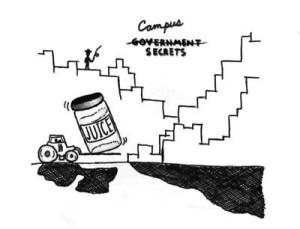On Feb. 5, JuicyCampus.com finally shut down. The controversial Web site, founded in 2007, gave college students nationwide a forum to air the worst gossip about their peers by posting it anonymously online. The day before the closure, JuicyCampus founder and CEO Matt Ivester wrote on the site’s official blog, “JuicyCampus’ exponential growth outpaced our ability to muster the resources needed to survive this economic downturn, and as a result, we are closing down the site.” Well, that is one way to put it.
There was probably no single factor at work in JuicyCampus’ demise. The site’s negative publicity may have driven potential advertisers away, especially considering the current economic climate. Investigations by the attorneys general of New Jersey and Connecticut as well as threats of lawsuits by college students claiming defamation, libel and consumer fraud may have contributed to the site’s closing as well.
Ivester won’t confirm this, of course. In fact, through the site’s entire tumultuous history, Ivester stuck to the argument that hosting forums for gossip and social malfeasance was not a crime and that by trying to shut JuicyCampus down, concerned universities and maligned students were actually seeking to restrict the right of anonymous gossips to freedom of expression.
The Web site may have seemed like a harmless diversion to most students; indeed, Georgetown’s JuicyCampus thread seemed to bear generally harmless gossip. But the outrage wasn’t unwarranted: The gossip posted online was very public – families, strangers and employers alike had access to the site. There have been cases at other colleges in which anonymous posters have not only mentioned individuals, but posted their names and addresses as well. There were two instances in which students used the perceived anonymity of the site to threaten to conduct shooting sprees at their respective schools.
From the start, Ivester hid his Web site behind the First Amendment while enabling petty and demeaning behavior on college campuses. He dismissed efforts to ban or boycott the site as heavy-handed and accused critics of “joining the ranks of the Chinese government in Internet censorship.” These antics, like JuicyCampus itself, were petty and manipulative. We all will do well without them.
Georgetown students – at least those who did not contribute to the Web site – should be proud of their response to JuicyCampus. When Ivester spoke on campus in October, students confronted him with challenging questions about the site’s questionable morals and its potential to cause real harm.
Last year, Georgetown Health Education Services created a useful alternative to JuicyCampus: the Hoyas Anonymous blog, which takes a page from the blog PostSecret by allowing students to write about themselves on pictures or postcards and post them anonymously online. This is the right way to allow students to vent and communicate – JuicyCampus was the wrong way.
Georgetown is an active campus with a strong sense of mission and little time for small-minded troublemakers who get their thrills in turning their peers against one another. Regardless of whether or not more drastic steps should have been taken against JuicyCampus – the debate has been rendered moot – the site was far more trouble than it was worth and, now that it’s gone, we say good riddance.
To send a letter to the editor on a recent campus issue or Hoya story or a viewpoint on any topic, contact opinionthehoya.com. Letters should not exceed 300 words, and viewpoints should be between 600 to 800 words.
“







